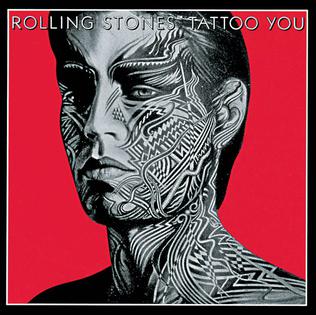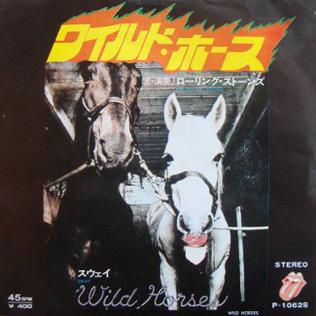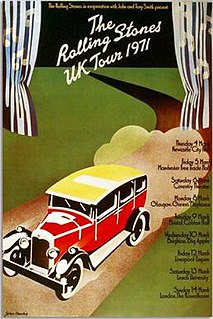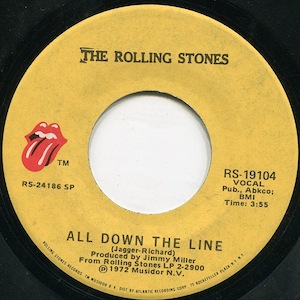Other uses
- Sticky Fingers, the ability, or "Stand" of Bruno Bucciarati, a character in the manga Golden Wind
Sticky Fingers is a 1971 album by the Rolling Stones.
Sticky Fingers may also refer to:

The Rolling Stones are an English rock band formed in London in 1962. Active for six decades, they are one of the most popular and enduring bands of the rock era. In the early 1960s, the Rolling Stones pioneered the gritty, heavier-driven sound that came to define hard rock. Their first stable line-up consisted of vocalist Mick Jagger, multi-instrumentalist Brian Jones, guitarist Keith Richards, bassist Bill Wyman, and drummer Charlie Watts. During their formative years, Jones was the primary leader: he assembled the band, named it, and drove their sound and image. After Andrew Loog Oldham became the group's manager in 1963, he encouraged them to write their own songs. Jagger and Richards became the primary creative force behind the band, alienating Jones, who had developed a drug addiction that interfered with his ability to contribute meaningfully.

Keith Richards, often referred to during the 1960s and 1970s as Keith Richard, is an English musician and songwriter, who has achieved international fame as the co-founder, guitarist, secondary vocalist and co-principal songwriter of the Rolling Stones. His songwriting partnership with Mick Jagger is one of the most successful in history. His career spans over six decades and his guitar playing style has been a trademark of the Rolling Stones throughout the band's career. Richards gained press notoriety for his romantic involvements and illicit drug use — and was often portrayed as a countercultural figure.

Exile on Main St. is the 10th British and 12th American studio album by the English rock band the Rolling Stones, released on 12 May 1972 by Rolling Stones Records. Recording began in 1969 in England during sessions for Sticky Fingers and continued in mid-1971 at a rented villa in the South of France named Nellcôte while the band lived abroad as tax exiles. A collage of various images, the album's artwork, according to frontman Mick Jagger, reflects the Rolling Stones as "runaway outlaws using the blues as its weapon against the world", showcasing "feeling of joyful isolation, grinning in the face of a scary and unknown future".

Charles Robert Watts was an English musician who achieved international fame as the drummer of the Rolling Stones from 1963 until his death in 2021.
Jann Simon Wenner is an American magazine magnate who is the co-founder and publisher of the popular culture magazine Rolling Stone, and former owner of Men's Journal magazine. He participated in the Free Speech Movement while attending the University of California, Berkeley. Wenner, with his mentor Ralph J. Gleason, co-founded Rolling Stone in 1967.

Tattoo You is the 16th British and 18th American studio album by the English rock band the Rolling Stones, released on 24 August 1981 by Rolling Stones Records. The album is mostly composed of studio outtakes recorded during the 1970s, and contains one of the band's most well-known songs, "Start Me Up", which hit number two on the US Billboard singles charts.

Michael Kevin Taylor is an English musician, best known as a former member of John Mayall's Bluesbreakers (1967–69) and the Rolling Stones (1969–74). As a member of the Stones, he appeared on: Let It Bleed (1969), Get Yer Ya-Ya's Out! The Rolling Stones in Concert (1970), Sticky Fingers (1971), Exile on Main St. (1972), Goats Head Soup (1973) and It's Only Rock 'n Roll (1974).

Sticky Fingers is the 9th British and 11th American studio album by the English rock band the Rolling Stones. The Stones released it on 23 April 1971 on their new, and own label Rolling Stones Records. They had been contracted by Decca Records and London Records in the UK and the US since 1963. On this album Mick Taylor made his second full-length appearance on a Rolling Stones album. It was the first studio album without Brian Jones who died two years earlier. The original cover artwork, conceived by Andy Warhol and photographed and designed by members of his art collective, The Factory, showed a picture of a man in tight jeans, and had a working zip that opened to reveal underwear fabric. The cover was expensive to produce and damaged the vinyl record, so later re-issues featured just the outer photograph of the jeans.

"Brown Sugar" is a song recorded by the English rock band the Rolling Stones. Written primarily by Mick Jagger, it is the opening track and lead single from their album Sticky Fingers (1971). It became a number one hit in both the United States and Canada. In the United Kingdom and Ireland, it charted at number two. In the United States, Billboard ranked it as the number 18 song for 1971. Rolling Stone magazine ranked it number 495 on its list of the 500 Greatest Songs of All Time in 2010 and number 490 in 2004 and at number five on their list of the 100 Greatest Guitar Songs of All Time.

Robert Henry Keys was an American saxophonist who performed with other musicians as a member of several horn sections of the 1970s. He appears on albums by the Rolling Stones, Lynyrd Skynyrd, Harry Nilsson, Delaney & Bonnie and Friends, George Harrison, John Lennon, Eric Clapton, Joe Cocker and other prominent musicians. Keys played on hundreds of recordings and was a touring musician from 1956 until his death in 2014.

"Wild Horses" is a song by the English rock band the Rolling Stones from their 1971 album Sticky Fingers. It was also released on 12 June 1971 as a single, with "Sway" as its B-side. Rolling Stone ranked the song number 334 in its "500 Greatest Songs of All Time" list in 2004 and number 193 in its 2021 update.
"Can't You Hear Me Knocking" is a track by English rock band the Rolling Stones from their 1971 album Sticky Fingers. The track is over seven minutes long, and begins with a Keith Richards open-G tuned guitar intro. The main song lasts for two minutes and 43 seconds, after which it transforms into an extended improvisational jam. The entire track was captured in one take, with the jam being a happy accident; the band had assumed the tape machine had been stopped, and were surprised to find the entire session had been captured. Originally they were going to end the song before the jam started, but were so pleased with the jam that they decided to keep it in. Besides the regular Rolling Stones members Mick Jagger (vocals), Keith Richards (guitar), Mick Taylor (guitar), Charlie Watts (drum), and Bill Wyman (bass), the track also features conga player Rocky Dijon, saxophonist Bobby Keys, organist Billy Preston, and additional percussion by producer Jimmy Miller.

"Sister Morphine" is a song written by Marianne Faithfull, Mick Jagger and Keith Richards. Faithfull released the original version of the song as the B-side to her Decca Records single "Something Better" on 21 February 1969. A different version was released two years later by the Rolling Stones for their 1971 album Sticky Fingers. Jagger produced the track.

The Rolling Stones' 1971 UK Tour was a brief concert tour of England and Scotland that took place over three weeks in March 1971.

"All Down the Line" is a song by the English rock band the Rolling Stones, which is included on their 1972 album Exile on Main St.. Although at one point slated to be the lead single from the album, it was ultimately released as a single as the B-side of "Happy."
Moonlight Mile can refer to:

Zip Code Tour was a concert tour by English rock band the Rolling Stones. It began on 24 May 2015 in San Diego and travelled across North America before concluding on 15 July 2015 in Quebec City. The tour was announced on 31 March 2015 with tickets going on sale to the general public two weeks later. The name is a reference to the jeans-related artwork for Sticky Fingers, which received a special re-release in 2015, and had its entire track list played during the Zip Code Tour.
Glen Carroll is an American musician, songwriter, record producer and lead vocalist. Carroll wrote and recorded Like A Rolling Stone, the "Top 10 Album" in 2013.
Sticky Fingers is a California and New York-based The Rolling Stones tribute/original recording band. It was formed by singer Glen Carroll in 1989 after his military service.

The tongue and lips logo or alternatively the lips and tongue logo, also known as the Hot Lips logo, or the Rolling Stones Records logo, or simply the Rolling Stones logo, is a logo designed by the English art designer John Pasche for the rock band The Rolling Stones in 1970. It has been called the most famous logo in the history of popular music. The logo has remained on all post-1970 albums and singles by the Rolling Stones, in addition to the band's merchandise and their stage sets.